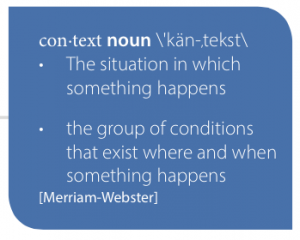
For most of digital marketing’s relatively short history, personalization has been the ne plus ultra of sophisticated marketing. Addressing the customer by name, knowing their age, gender, date of birth, purchase history – all these data points help marketers deliver messages that are more meaningful and more relevant – and that, by extension, result in higher conversations and deeper loyalty.
Personalization is now being supplanted by technologies that can drive even deeper marketing and experiential relevance. Context’s untapped opportunity is to get an extremely granular understanding of customers, then to anticipate their needs, wants, affinities and expectations, and develop unique insights to power better marketing across all devices, channels, localities, and brand experiences.
Context, in other words, takes not only the ‘who’ into account, but also the when, where, why, and how. Simply put, it’s deeper targeting and more on-point messaging.
Under the auspices of our client SDL, I recently authored a white paper, Why Context Is Essential to Digital Marketing (PDF download) that looks at marketing beyond the right message, to the right person at the right time. Contextual marketing goes further by considering the platform consumers are using; their physical location (perhaps, using iBeacon technology, down to the store shelf level); even real-time information such as atmospheric conditions (is it raining?) or geo-spatial movement (whether they are in a vehicle stopped at a red light, for instance).
What type of coupon should a customer receive? When, and for what type of offer? MGM Resorts makes these determinations contextually; sending offers to guests’ smartphones based on where they are on the resort property (which restaurant, shop, show, or casino) as well as in the context of their individual loyalty member status and stated interests.
Context in marketing can only be fueled by powerful, integrated technologies. Its components range from semantic technologies to machine learning and predictive analytics, customer data, product/service data, flexible, dynamic content, and journey-mapping.
Without a doubt, context is complex. Moreover it is growing in importance, not only because it’s increasingly technologically feasible and effective, but also because newer technologies (the Internet of Things and Beacons, for example) will enable additional layers of context to meet consumers’ growing expectations for contextually relevant experiences and messaging from the brands they interact with in an increasingly digital world.
